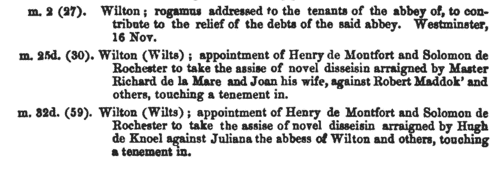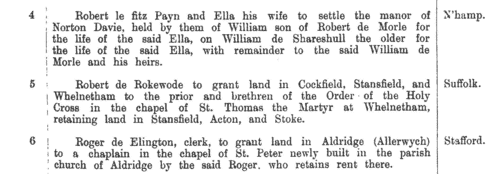Grafham Surname Ancestry ResultsOur indexes 1000-1999 include entries for the spelling 'grafham'. In the period you have requested, we have the following 14 records (displaying 1 to 10): Buy all | | | Get all 14 records to view, to save and print for £74.00 |
These sample scans are from the original record. You will get scans of the full pages or articles where the surname you searched for has been found. Your web browser may prevent the sample windows from opening; in this case please change your browser settings to allow pop-up windows from this site. Grantees of royal lands and pardons
(1155-1158)
The Great Rolls of the Pipe are the central record of the crown compiling returns of income and expenditure from the sheriffs and farmers of the various English counties or shires. This is the oldest series of public records, and the earliest surviving instances of many surnames are found in the Pipe Rolls. The rolls for the 2nd, 3rd and 4th years of the reign of king Henry II are covered by this volume: this is a period for which there are no other general English records, so these rolls give details of many persons and incidents otherwise utterly unknown. Most (but not all) of the entries in which names appear relate to payments for grants of land and pardons. There is a separate return in each year for each shire, the name of the shire being here printed at the top of each page. Wales was still independent, in separate kingdoms, at this period, and is not included, except for 'Herefordshire in Wales'. There is virtually no reference to the palatinates of Chester, Lancaster and Durham, or to Cumberland and Westmoreland in the far northwest.GRAFHAM. Cost: £4.00.  | Sample scan, click to enlarge

| Curia Regis Rolls
(1196-1201)
The Curia Regis, king's court, of mediaeval England took cases from throughout the country, and its records are among the most important surviving from this early period.GRAFHAM. Cost: £4.00.  | Sample scan, click to enlarge

| Curia Regis Rolls
(1210-1212)
The Curia Regis, king's court, of mediaeval England took cases from throughout the country, and its records are among the most important surviving from this early period.GRAFHAM. Cost: £4.00.  | Sample scan, click to enlarge

| Patent Rolls: entries for Huntingdonshire
(1275-1276)
Calendars of the patent rolls of the reign of king Edward I are printed in the Calendars of State Papers: but these cover only a fraction of the material on the rolls. From 1881 to 1889 the reports of the Deputy Keeper of the Public Record Office also include calendars of other material from the rolls - about five times as many entries as in the State Papers - predominantly mandates to the royal justices to hold sessions of oyer and terminer to resolve cases arising locally; but also other general business. The calendar for the 4th year of king Edward I [20 November 1275 to 19 November 1276], hitherto unindexed, is covered here.GRAFHAM. Cost: £6.00.  | Sample scan, click to enlarge

| Grantees of offices, commissions and pardons
(1272-1281)
The Patent Rolls are the Chancery enrolments of royal letters patent. Those for the 1st to the 9th years of the reign of king Edward I (29 November 1272 to 17 November 1281) were edited for the Public Record Office by J. G. Black, and published in 1901. The main contents are royal commissions and grants; ratifications of ecclesiastical estates; writs of aid to royal servants and purveyors; and pardons. GRAFHAM. Cost: £2.00.  | Sample scan, click to enlarge

| Broughton Court Rolls
(1295)
Among the possessions of Ramsey abbey was the manor or honor of Broughton in Huntingdonshire. Among the Augmentation Office Court Rolls in the Public Record Office, a roll of six rotulets (Portf. 5, No. 29) records the business of the manor court from 19 May 1293 to 11 January 1295. This was transcribed by F. W. Maitland, extending the Latin but retaining the spelling of the proper names, and printed with a facing English translation in 1889. In many cases the surnames were also Englished, but we have reindexed the text on the original forms alone. 11 January 1295GRAFHAM. Cost: £4.00.  | Sample scan, click to enlarge

| Landowners and tenants in Bedfordshire
(1345-1485)
Inquisitions ad quod damnum were held by the appropriate sheriff or escheator (or other officer in whose bailiwick the matter in question might lie) to investigate cases in which the royal or public interest might be damaged by proposed alienation or settlement of land (especially alienation to religious uses, into mortmain). The key findings from these inquisitions were as to the tenure of the land and the service due from it; its yearly value; the lands remaining to the grantor, and whether they sufficed to discharge all duties and customs due from him; and whether he can still be put upon juries, assizes and recognitions, so that the country be not burdened by his withdrawal from them. Generally speaking, this process had the makings of a system of licensing such alienations, and raising money in proportion to the valuations. Equally, there are many items that deal with subjects such as the closing of public roads, the felling or inclosing of woods, or the proposed grant of liberties or immunities. A calendar of these inquisitions from the 19th year of the reign of king Edward III to the 2nd year of Richard III was prepared by the Public Record Office and published in 1906. We have now indexed this calendar by surname and county. Most of the individuals appearing in the calendar are either pious individuals seeking to make grants to religious bodies for the sake of their souls; or landowners securing the disposition and settling of their real estate. But some other names do appear - tenants, trustees, chaplains and clerks.GRAFHAM. Cost: £6.00.  | Sample scan, click to enlarge

| Allegations for marriages in southern England
(1660-1669)
The province or archbishopric of Canterbury covered all England and Wales except for the northern counties in the four dioceses of the archbishopric of York (York, Durham, Chester and Carlisle). Marriage licences were generally issued by the local dioceses, but above them was the jurisdiction of the archbishop, exercised through his vicar-general. Where the prospective bride and groom were from different dioceses it would be expected that they obtain a licence from the archbishop; in practice, the archbishop residing at Lambeth, and the actual offices of the province being in London, which was itself split into myriad ecclesiastical jurisdictions, and spilled into adjoining dioceses, this facility was particularly resorted to by couples from London and the home counties, although there are quite a few entries referring to parties from further afield. The abstracts of the allegations given here usually state name, address (street in London, or parish), age, and condition of bride and groom; and sometimes the name, address and occupation of the friend or relative filing the allegation. Where parental consent was necessary, a mother's or father's name may be given. The ages shown should be treated with caution; ages above 21 tended to be reduced, doubtless for cosmetic reasons; ages under 21 tended to be increased, particularly to avoid requiring parental consent; a simple statement 'aged 21' may merely mean 'of full age' and indicate any age from 21 upwards. These are merely allegations to obtain licences; although nearly all will have resulted in the issuing of the licence, many licences did not then result in marriage. GRAFHAM. Cost: £4.00.  | Sample scan, click to enlarge

|  Masters of clerks and apprentices
(1780) Masters of clerks and apprentices
(1780)
Apprenticeship indentures and clerks' articles were subject to a 6d or 12d per pound stamp duty: the registers of the payments usually give the master's trade, address, and occupation, and the apprentice's name, as well as details of the date and length of the apprenticeship. 3 January to 30 December 1780. IR 1/30GRAFHAM. Cost: £8.00.  | Sample scan, click to enlarge

|  Masters of clerks and apprentices
(1787) Masters of clerks and apprentices
(1787)
Apprenticeship indentures and clerks' articles were subject to a 6d or 12d per pound stamp duty: the registers of the payments usually give the master's trade, address, and occupation, and the apprentice's name, as well as details of the date and length of the apprenticeship. 2 January to 31 December 1787. IR 1/33GRAFHAM. Cost: £8.00.  | Sample scan, click to enlarge

|
| 1 | 2 |  |
Research your ancestry, family history, genealogy and one-name study by direct access to original records and archives indexed by surname.
|













